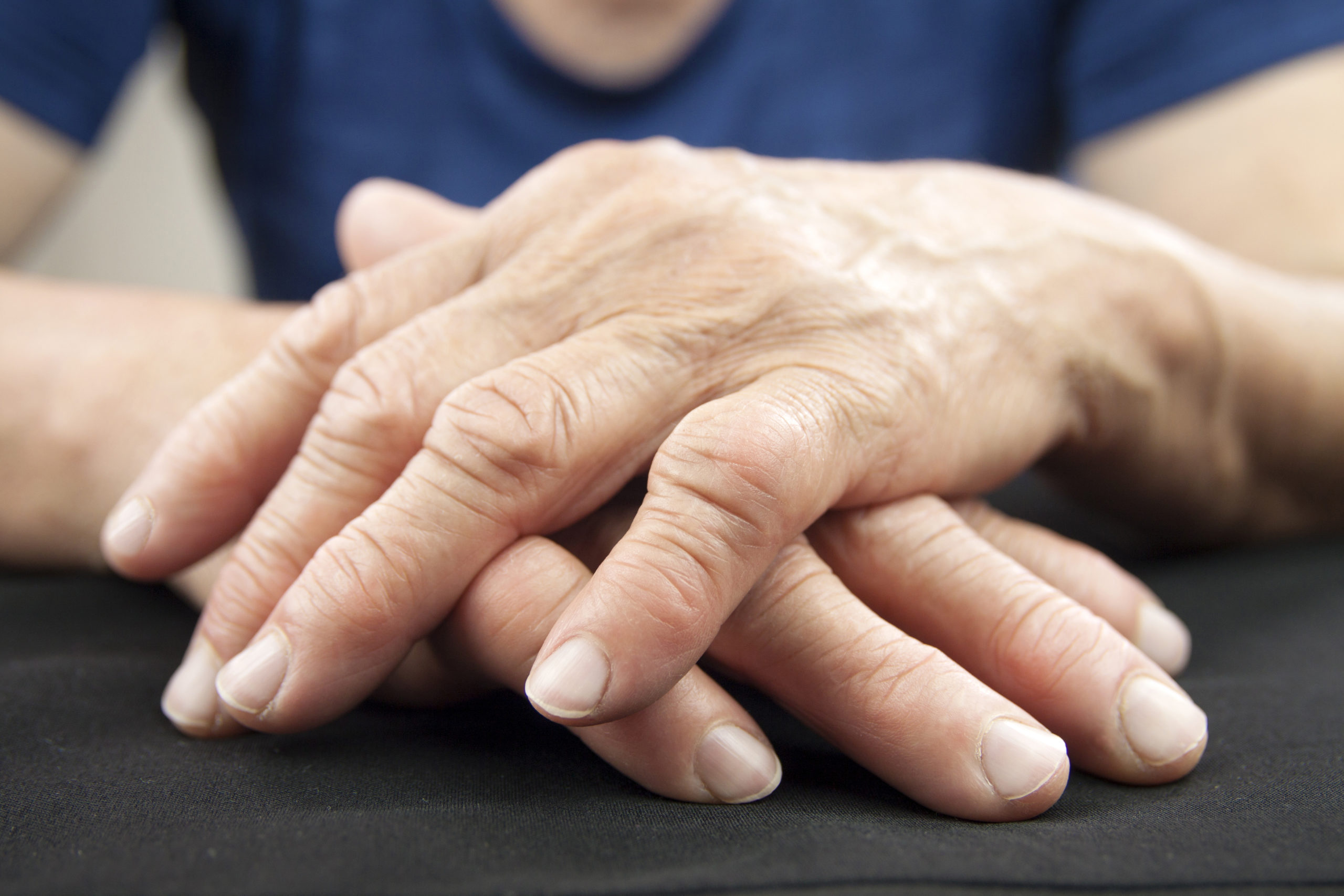What are Menopause Tingling & Shocks [Parasthesia]?
Tingling and electric shock sensations are a type of peripheral neuropathy. Peripheral neuropathy is the general term for symptoms that result when your peripheral nervous system (all the nerves other than those in your brain and spinal cord) is damaged or impaired in some way. When this happens, nerves send abnormal signals that result in painful or uncomfortable sensations. [1] Two of the most common symptoms of peripheral neuropathy are tingling sensations, like pins and needles, and sensations of electric shocks. These specific sensations are frequently reported by women in the menopausal transition. Other symptoms are also possible, including problems using your fingers to pick up or hold things, numbness, more or less sensitivity to cold and heat (compared to your normal sensitivity) and burning sensations.

One study found that the post-menopausal age group is at greater risk of peripheral neuropathy and determined that declining estrogen levels, as seen during the menopausal transition, critical in the development of the condition. [2] This supports the tingling in breast menopause experience as well as the prickly itchy skin menopause experience.
Any type of neuropathy is a symptom of some other problem occurring in your body. There are multiple causes of peripheral neuropathy, including cancer, cancer treatments, diabetes, infections, poor circulation, or low vitamin B levels. If you have or may have any of these conditions it is important to talk to your healthcare provider to rule out any serious underlying problems that may be causing your tingling or electric shock sensations.
Self-care & Natural Remedies for Menopause Tingling & Shocks
There are multiple causes of peripheral neuropathy, so getting relief in the long-term is only possible if the specific cause of your tingling and shocks is identified and resolved. This may or may not be possible, and even when the cause is known, damage to your nervous system may not be reversible.
Despite that bad news, there are steps you can take to help your nervous system on your own. Consider these suggestions:
- Avoid drinking alcohol, as it can damage nerves directly and could make your tingling and shocks worse.
- Control your blood sugar, especially if you are diabetic, because high blood sugar levels can be damaging to nerves. [3]
- Keep hydrated so your nervous system can efficiently and effectively transmit signals. [4]
- Eat a healthy diet rich in fruits, vegetables, whole grains and lean protein to support a healthy nervous system. Pay particular attention to getting sufficient B vitamins (including B-1, B-6 and B-12), vitamin E and niacin as these all play an important role in keeping nerves healthy. Meats, fish, eggs, low-fat dairy foods and fortified cereals are all excellent sources of vitamin B-12. If you are vegetarian or vegan and have any concerns about adequate B vitamin intake, talk to your healthcare provider about B-12 supplements. [5]
- Exercise regularly, aiming for at least 30 minutes to one hour of exercise at least three times a week. [5]
Meditation, relaxation, breathing and mindfulness exercises can be effective in helping anxiety and menopause tingling as well as managing pain. Talk to your healthcare provider or seek out a yoga or meditation studio that can provide guidance and community resources.

Therapy & Treatment for Menopause Tingling & Shocks
At age 40 find a reliable, educated primary care provider familiar with recognizing and treating symptoms of perimenopause and menopause. The North American Menopause Society provides a list of menopause practitioners here.
If your neuropathy is caused by a treatable condition, managing the condition might result in stopping the neuropathy or preventing it from getting worse. [6] For women experiencing tingling and/or shocks as a result of the menopausal transition, addressing declining hormone levels with Hormone Therapy (HT) can be helpful in reducing or even stopping these unpleasant sensations.

If the sensations of tingling or electric shocks become too intense or too disruptive, speak to your healthcare provider who may prescribe medications to help. These treatments, that focus on addressing the pain and discomfort associated with peripheral neuropathy, include the following:
- Steroids, although this is usually just a short-term treatment.
- Prescription numbing creams or patches.
- Anti-seizure medicines, which are often used to help treat nerve pain. [3]
- Antidepressants, particularly tricyclic antidepressants (such as amitriptyline, doxepin, and imipramine) and venlafaxine, bupropion, and duloxetine. The mechanism that causes these antidepressants to be effective in pain management isn’t fully understood, but its effectiveness is clinically recognized. [7]
Other treatments that may be helpful to deal with chronic tingling or electric shock sensations could include:
- Acupuncture
- Physical and/or restorative therapy – Working with a physical therapist is recommended for all chronic pain conditions.
- Psychological treatments / therapies – These include cognitive behavioral therapy (CBT), biofeedback, and relaxation training as well as psychotherapy, group therapy, or counselling. Randomized controlled trials (RCTs) indicate that these therapies can provide relief of back pain or other chronic pain conditions for up to two years. [8]
The Science
Your central nervous system is made up of your brain and your spinal cord. Your peripheral nervous system is made up of all of the nerves that are located outside of the central nervous system. Your peripheral nervous system sends information, including sensory information, from your brain and spinal cord (central nervous system) out to the rest of your body. The tingling or electric shock sensations are experienced when any of the nerves in your peripheral nervous system are damaged or dysfunctional in some way.

In a healthy nervous system, when nerve cells are stimulated in some way they send a signal to your brain along the nervous system pathway. Your brain then sends a response signal back down the nervous system pathway that causes a physical response of some type. For example if you touch something hot your nerve cells sense the heat and send a signal to your brain about it. Your brain will then send a response to move your hand away from the source of the heat. Tingles and electric shock sensations occur when your peripheral nervous system sends signals in the absence of any stimulus.
There are over 100 recognized types of peripheral neuropathy and each of these has its own characteristic symptoms and treatment plans. Peripheral neuropathies are classified based on which type of peripheral nerve is affected:
Sensory neuropathy occurs when sensory nerves that control what you feel (e.g. pain, sensations) are damaged or not functioning properly.
Motor neuropathy occurs when the nerves that control your muscles (and your movements) are damaged or not functioning properly. This can cause issues with your balance or your grip.
Autonomic nerve neuropathy occurs when your autonomic nerves, which control core body functions such as breathing and the beating of your heart, are damaged or not functioning properly. This type of peripheral neuropathy can be very serious, even life-threatening.
Combination neuropathies that occur if you have two or all three peripheral nerve types involved. For example, you could experience a sensory-motor neuropathy. [5] [9]
Myths & Mysteries
It was found to be the decline in estrogen.
One study found that the post-menopausal age group is at greater risk of peripheral neuropathy and determined that declining estrogen levels, as seen during the menopausal transition, critical in the development of the condition. [2]
[2] Singh A, Asif N, Singh PN, Hossain MM. Motor Nerve Conduction Velocity In Postmenopausal Women with Peripheral Neuropathy. J Clin Diagn Res. 2016 Dec;10(12):CC13-CC16. doi: 10.7860/JCDR/2016/23433.9004. Epub 2016 Dec 1. PMID: 28208850; PMCID: PMC5296423.
The “tingling” sensation can be felt anywhere on your skin, even your face.
One study found that the post-menopausal age group is at greater risk of peripheral neuropathy and determined that declining estrogen levels, as seen during the menopausal transition, critical in the development of the condition. [2]
Any type of neuropathy is a symptom of some other problem occurring in your body. There are multiple causes of peripheral neuropathy, including cancer, cancer treatments, diabetes, infections, poor circulation, or low vitamin B levels. If you have or may have any of these conditions it is important to talk to your healthcare provider to rule out any serious underlying problems that may be causing your tingling or electric shock sensations.
[2] Singh A, Asif N, Singh PN, Hossain MM. Motor Nerve Conduction Velocity In Postmenopausal Women with Peripheral Neuropathy. J Clin Diagn Res. 2016 Dec;10(12):CC13-CC16. doi: 10.7860/JCDR/2016/23433.9004. Epub 2016 Dec 1. PMID: 28208850; PMCID: PMC5296423.
One study found that the post-menopausal age group is at greater risk of peripheral neuropathy and determined that declining estrogen levels, as seen during the menopausal transition, critical in the development of the condition. [2]
Any type of neuropathy is a symptom of some other problem occuring in your body. There are multiple causes of peripheral neuropathy, including cancer, cancer treatments, diabetes, infections, poor circulation, or low vitamin B levels. If you have or may have any of these conditions it is important to talk to your healthcare provider to rule out any serious underlying problems that may be causing your tingling or electric shock sensations.
[2] Singh A, Asif N, Singh PN, Hossain MM. Motor Nerve Conduction Velocity In Postmenopausal Women with Peripheral Neuropathy. J Clin Diagn Res. 2016 Dec;10(12):CC13-CC16. doi: 10.7860/JCDR/2016/23433.9004. Epub 2016 Dec 1. PMID: 28208850; PMCID: PMC5296423.
MYSTERY
Research has shown that declining levels of estrogen are associated with the development of peripheral neuropathy. [2] How declining estrogen levels actually cause the nerve damage of peripheral neuropathy is an area of concern that needs further research.
FALSE
Neuropathy symptoms can vary dramatically, depending on the cause and the stage of neuropathy. The peripheral nerves involved will determine where your symptoms occur (neuropathy of your sensory nerves can affect what you feel; neuropathy of your motor nerves can affect your balance or your grip; neuropathy of your autonomic nerves can be extremely dangerous by affecting your heart or breathing rates. As well, early neuropathy symptoms are usually experienced as mild numbness and tingling, while neuropathy at later stages can be experienced as sharp pains, loss of balance, or significant muscle weakness.
FALSE
Research studies have shown that peripheral nerves can be healed after they have been damaged. The process is slow and depends on the severity of the damage and the time that has passed since the damage. If decreased estrogen during your menopausal transition is the cause of your peripheral neuropathy, hormone therapy may stop your symptoms. Working with a physical or occupational therapist can also be helpful. Talk to your healthcare provider to find the best treatment approach for your individual situation.
FALSE
While peripheral neuropathy is common in diabetic patients, there are over 100 types of peripheral neuropathy all of which have their own cause other than diabetes. Other causes of peripheral neuropathy include decreased levels of estrogen, chemotherapy, B-vitamin deficiency, and side effects associated with commonly prescribed medications.
Citations
[1] Campbell JN, Meyer RA. Mechanisms of neuropathic pain. Neuron. 2006 Oct 5;52(1):77-92. doi: 10.1016/j.neuron.2006.09.021. PMID: 17015228; PMCID: PMC1810425.
[2] Singh A, Asif N, Singh PN, Hossain MM. Motor Nerve Conduction Velocity In Postmenopausal Women with Peripheral Neuropathy. J Clin Diagn Res. 2016 Dec;10(12):CC13-CC16. doi: 10.7860/JCDR/2016/23433.9004. Epub 2016 Dec 1. PMID: 28208850; PMCID: PMC5296423.
[3] https://www.cancer.org/latest-news/what-is-peripheral-neuropathy.
[4] https://calgaryneuropathy.com/41-keep-hydrated/
[5] https://www.mayoclinic.org/diseases-conditions/peripheral-neuropathy/symptoms-causes/syc-20352061
[6] https://my.clevelandclinic.org/health/diseases/14737-neuropathy
[7] Sansone RA, Sansone LA. Pain, pain, go away: antidepressants and pain management. Psychiatry (Edgmont). 2008 Dec;5(12):16-9. PMID: 19724772; PMCID: PMC2729622.
[8] Practice Guidelines for Chronic Pain Management: An Updated Report by the American Society of Anesthesiologists Task Force on Chronic Pain Management and the American Society of Regional Anesthesia and Pain Medicine. Anesthesiology 2010; 112:1–1
[9] https://www.hopkinsmedicine.org/health/conditions-and-diseases/peripheral-neuropathy#causes
Original content, last updated February 22, 2023.
© 2025 Herstasis® Health Foundation


